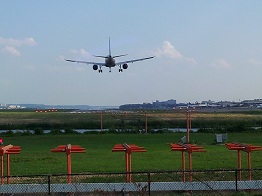 Stop me if you’ve heard this one. A Norwegian airline registers its aircraft in Ireland, “rents” flight crews based in Thailand covered by the labor laws of Singapore, and then applies for a foreign air carrier permit from the United States. Unfortunately, this is not the start of a bad joke but a new business model being peddled by Norwegian Air Shuttle (NAS). In comments filed with the Department of Transportation yesterday, TTD urged the DOT to reject this “flag of convenience” scheme that is specifically designed to undercut wages and working conditions of aviation employees.
Stop me if you’ve heard this one. A Norwegian airline registers its aircraft in Ireland, “rents” flight crews based in Thailand covered by the labor laws of Singapore, and then applies for a foreign air carrier permit from the United States. Unfortunately, this is not the start of a bad joke but a new business model being peddled by Norwegian Air Shuttle (NAS). In comments filed with the Department of Transportation yesterday, TTD urged the DOT to reject this “flag of convenience” scheme that is specifically designed to undercut wages and working conditions of aviation employees.
TTD President Ed Wytkind also denounced the NAS application in this opinion piece in Aviation Daily. He noted that this debate is timely and relevant as the EU is seeking to include aviation in the broader and more complex Transatlantic Trade and Investment Partnership (TTIP) negotiations, specifically making this point:
“The EU is attempting to jam aviation into those talks with the ultimate goal of gutting current foreign ownership and control laws and weakening U.S. rules that reserve U.S. domestic point-to-point airline service (cabotage) for U.S. airlines. Under the EU’s vision, we’d cede control of our airlines to foreign investors who will decide who crews flights, who maintains and services aircraft, who works in reservations and who reaps the profits.”
Finally, Ed raised these and other international aviation issues in his testimony last week in front of the House Aviation Subcommittee. And he made an additional point that too often is forgotten: If we are to have an efficient domestic aviation system and an industry that can compete internationally, we need a well-funded air traffic control operation. Sequestration, furloughs and government shutdowns have had a terrible impact on the FAA and its ability to provide the services and oversight that is integral to our aviation system.
There is a lot at stake for aviation employees. We need smart government policies that promote U.S. competitiveness so that our aviation industry can continue to thrive and bring high-quality U.S. aviation jobs to the table.